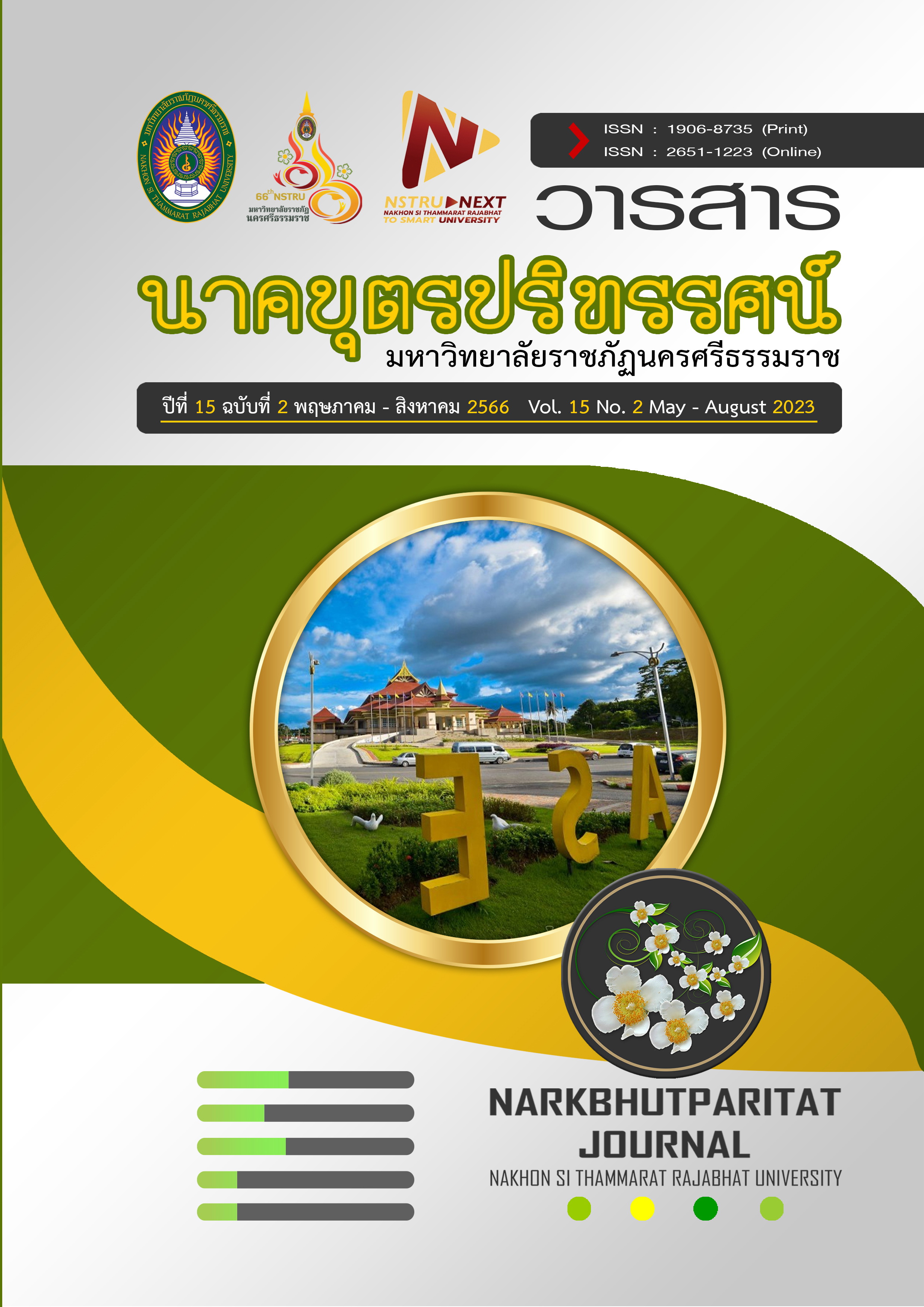การพัฒนากระบวนบริหารงานคุณภาพ (PDCA) เพื่อส่งเสริมทักษะในศตวรรษที่ 21 ของนักศึกษาสาขาวิชาเคมี ชั้นปีที่ 3 และ 4 มหาวิทยาลัยราชภัฏนครศรีธรรมราช
Main Article Content
บทคัดย่อ
งานวิจัยนี้มีเป้าหมายในการพัฒนากระบวนบริหารงานคุณภาพ (PDCA) เพื่อส่งเสริมทักษะในศตวรรษที่ 21 ของนักศึกษา สาขาวิชาเคมี ชั้นปีที่ 3 และ 4 มหาวิทยาลัยราชภัฏนครศรีธรรมราช เพื่อให้มีทักษะที่สามารถรองรับการเปลี่ยนแปลงอย่างรวดเร็วทางด้านวิทยาศาสตร์และเทคโนโลยี โดยหลักสูตรได้จัดการเรียนการสอน
ในรายวิชาสัมมนาเคมีเฉพาะทางในรูปแบบภาษาอังกฤษ และใช้เป็นแนวทางการวิจัยในรายวิชาโครงการวิจัย
ทางเคมี ในระหว่างปีการศึกษา 2560-2563 ประเมินทักษะในศตวรรษที่ 21 ของนักศึกษาจากการปฏิบัติ (Performance assessment) พบว่าคะแนนประเมินทักษะปฏิบัติในปีการศึกษา 2560 อยู่ในระดับปานกลาง หลังจากหลักสูตรได้นำกระบวนการพัฒนาทักษะในศตวรรษที่ 21 มาปฏิบัติในปีการศึกษา 2561-2563 พบว่าคะแนนประเมินทักษะปฏิบัติอยู่ในระดับมาก จากการประเมินตามสภาพจริง (Authentic assessment) โดยพิจารณาจากการเข้าร่วมแข่งขันในเวทีระดับชาติและนานาชาติ พบว่านักศึกษาได้รับรางวัลในเวทีต่าง ๆ เพิ่มขึ้น แสดงถึงการยกระดับคุณภาพนักศึกษาเชิงประจักษ์ หลักสูตรได้นำผลจากการประเมินมาปรับปรุงกระบวนการอย่างต่อเนื่อง ส่งผลให้คะแนนประเมินทักษะการเรียนรู้ในศตวรรษที่ 21 ปีการศึกษา 2560-2563 มีแนวโน้มที่เพิ่มอย่างชัดเจน คณะวิทยาศาสตร์และเทคโนโลยีใช้กระบวนการพัฒนาทักษะภาษาอังกฤษผ่านรายวิชาสัมมนาของหลักสูตรเป็นต้นแบบในการพัฒนานักศึกษาสาขาวิชาอื่น ๆ ส่งผลให้หลักสูตรได้รับรางวัลแนวปฏิบัติที่ดีด้านการพัฒนานักศึกษา ประจำปีพ.ศ. 2563 แสดงให้เห็นถึงประสิทธิภาพและประสิทธิผลในการใช้กระบวนการ PDCA สำหรับพัฒนาทักษะในศตวรรษที่ 21 ของนักศึกษาเคมี
Article Details

อนุญาตภายใต้เงื่อนไข Creative Commons Attribution-NonCommercial-NoDerivatives 4.0 International License.
เอกสารอ้างอิง
Charoenyot, S., Nillapun, M. & Patphol, M. (2020). The development of an instructional model based on active learning to enhance chemistry learning and critical thinking skills concept of upper secondary students, Suthiparithat Journal, 34(109), 46-57. (in Thai)
Daosri, Th., Thipkonglad, P., Khemphong, P. & Pengpis, S. (2021). The study of the learning management approach of school in the 21st century. Journal of Humanities and Social Sciences Nakhon Pathom Rajabhat University, 11(1), 59–74. (in Thai)
Deekhamhai, Y. & Jermtaisong, R. (2022). The Development of Learning Management in Discovery Method and Collaborative Learning to Enhance Scientific Inquiry Competency in Science Subject for Secondary 3 ( Grade 9 ) Students. 1, 322–334. (in Thai)
Hadinugrahaningsih, T., Rahmawati, Y. & Ridwan, A. (2017). Developing 21st century skills in chemistry classrooms: Opportunities and challenges of STEAM integration. AIP Conference Proceedings, 1868.
Marteel-Parrish, A. E. & Lipchock, J. M. (2018). Preparing Chemistry Majors for the 21st Century through a Comprehensive One-Semester Course Focused on Professional Preparation, Contemporary Issues, Scientific Communication, and Research Skills. Journal of Chemical Education, 95(1), 68–75.
Paramasivam, S., Saad, N. H., Han, F. P. & Thing, G. T. (2023). Applying the PDCA Continuous Improvement Cycle on. AIP Conference Proceedings, 2571, 060009.
Rahmawati, Y., Agustin, M. A., Ridwan, A., Erdawati, E., Darwis, D. & Rafiuddin, R. (2019). The development of chemistry students’ 21 century skills through a STEAM project on electrolyte and non-electrolyte solutions. Journal of Physics: Conference Series, 1402, 055049.
Sankaburanurak, S. & Sankaburanurak, A. (2015). Curriculum management in 21st century: A classroom as Wide as the World. Social Sciences Research and Academic Journal Curriculum, 10(28), 1–14. (in Thai)
Thonghaew, S. & Chaijaroen, K. (2020). Project-Based Learning (PBL) Enhancing/Promoting the 21st Century Learning Skills of Chinese Major Students: Project-Based Learning (PBL). Journal of Modern Learning Development, 5(5), 1–12. (in Thai)
Office of the Education Council. (2017). Status of Thai Education in 2016/2017. Guidelines for Reforming Thai Education to Move Towards Thailand 4.0. Bangkok: Office of the Education Council Secretariat. (in Thai)


